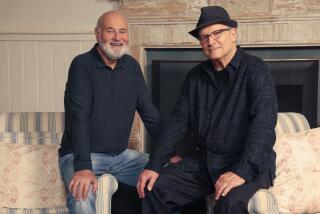Larry Rhine; Award-Winning Writer for Radio, Film and TV
- Share via
Larry Rhine, who wrote his way across radio, television and motion picture entertainment for more than half a century, from the aural “Duffy’s Tavern” to the visual “Here’s Lucy,” “All in the Family” and “The Brady Bunch,” has died. He was 90.
Rhine, who received the Pioneer Broadcasters’ Diamond Circle Plaque only two weeks before his death, died Friday in Los Angeles, said his son, screenwriter Robert Steven Rhine.
The television series “All in the Family,” starring Carroll O’Connor as the irascible Archie Bunker, earned Rhine myriad awards for his scripts. He was twice nominated for Emmys and won a Writers Guild Award, a Humanitas Award, a Golden Globe and a Heartfund Award.
Rhine called Norman Lear, who created and produced the show, “the greatest boon to writers since the inflated seat cushion.” He described his own favorite “Learism” as the maestro’s “compliment” to writers: “This is the greatest script I’ve ever seen. It will rewrite well.”
Born in San Francisco, Rhine was educated at UC Berkeley, where he headed an internationally competitive debating team. In 1934, he began his entertainment career at radio station KGB in San Diego as a writer, announcer and director alongside Art Linkletter. Rhine wrote segments for several popular radio shows, including “The Life of Riley,” “G.E. Theater” and “The Colgate Comedy Hour.”
When he wrote for the 1941-51 radio comedy series “Duffy’s Tavern,” Rhine took a particular interest in actress Hazel Shermet, one in a string who portrayed Miss Duffy, the giddy, man-crazy daughter of the tavern owner. As Rhine described it later, “Our romance deteriorated into marriage. My first residual.”
Rhine worked as a Hollywood screenwriter for Universal Pictures and Twentieth Century Fox during the late 1930s. Among other scripts, he wrote the 1941 shipboard comedy “Six Lessons From Madame La Zonga” with a title based on a popular song of the day.
During World War II, Rhine worked for the Office of War Information out of San Francisco, broadcasting American propaganda into Japan, including an American version of Japan’s “Tokyo Rose.” He worked extensively to publicize Gen. Douglas MacArthur’s historic “I shall return” speech, distributing the vow on matchbook covers and other printed materials as well as over the airwaves. But when he suggested that the slogan be changed to “We shall return,” MacArthur was so outraged that he banned Rhine from the legendary return of the American forces to Corregidor. MacArthur’s disapproving slap in the face probably saved Rhine, because the shore boat to which he had been assigned was bombed and the survivors were imprisoned by the Japanese.
After the war, Rhine segued easily from radio and film to television. Over the years, he wrote for such series as “Mr. Ed,” “Sanford and Son,” “Red Skelton,” “The Bob Hope Show,” “Bachelor Father” and “Gimme a Break.” He created and was executive producer of the 1979-80 series “Joe’s World,” a family sitcom featuring a Detroit house painter, and produced the 1981 television special “Nuts and Bolts.”
In a 1996 article for the Writers Guild of America Journal, Rhine summed up his career as “a giddy gallop on a fast track.”
“A comedy writer’s life,” he said, “is a blur of vignettes recalled during retirement. Like that oft-quoted ‘Mr. Ed’ rewrite session when series co-owner George Burns immortalized ‘The horse wouldn’t say that,’ and my partner, Lou Derman, piped up with, ‘Let the horse decide.’ ”
After Red Skelton’s death in 1997, Rhine wrote a letter to the editor published in The Times, offering his sympathy to Skelton’s beloved characters, Freddie the Freeloader, Clem Kadiddlehopper and Sheriff Deadeye. Rhine recalled that Skelton always told his writers: “I won’t mind dying if I can tell St. Peter a joke he hasn’t heard.”
Rhine was interviewed last year for the Television Academy of Art and Sciences Archive of American Television.
Through the 1960s, Rhine served on the board of trustees of the Producer-Writers Guild of America Pension Plan in Los Angeles, heading the board in 1968. The organization awarded him its Founders Award in 1974 and its Founders Plaque in 1980.
He is survived by his wife of 50 years, Hazel Shermet Rhine; their son, Robert; and their daughter, Vicki Rhine Trevena.
More to Read
The complete guide to home viewing
Get Screen Gab for everything about the TV shows and streaming movies everyone’s talking about.
You may occasionally receive promotional content from the Los Angeles Times.






